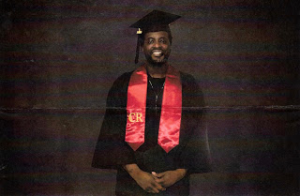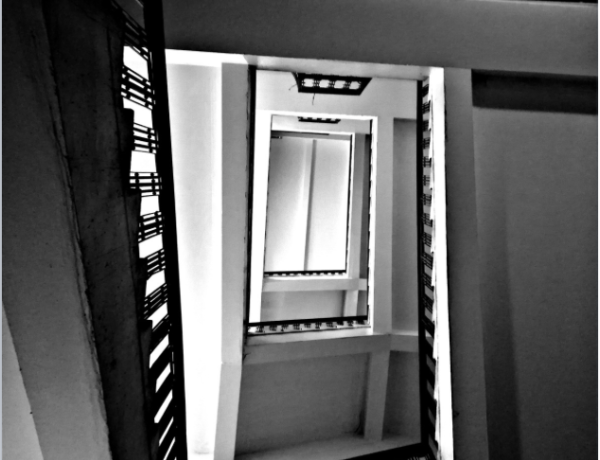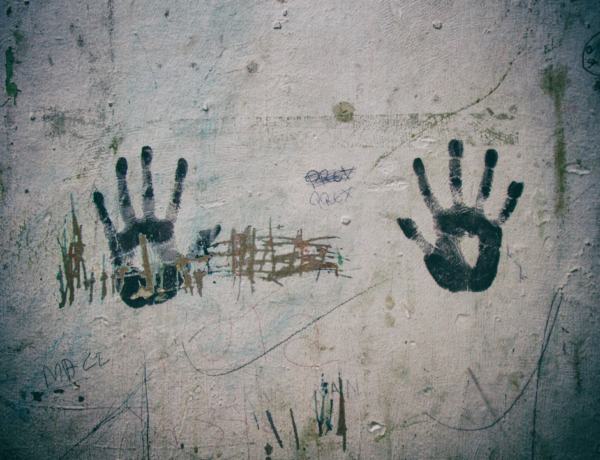By Millard Baker
I really loathe the attire I wear. My attire represents the miscreant individual I was. The dark blue pants have “CDCR Prisoner” written on the front pant leg. The light blue shirt has the same words written across the back of it. The average person would immediately identify the attire as penitentiary wear, worn by convicted criminals who negatively impacted society. I am devastated over the fact my thoughts, decisions and actions led to my criminalizing society, which did not deserve any of it. At the time, my life was in turmoil. In fact, my muscle of life was in atrophy. So, in my misery, I cared less for others. That diseased way of thinking was a danger to society and better fitted for incarceration and the scraggly attire that comes with it. I deserved to wear that attire; I was a terrible guy who I now, honestly, hate. I speak about myself in such a dastardly way because it’s the truth.
I began to want different though. I was cognitive enough to understand that in order to change my attire I had to change myself. I started my journey of transformation, fully aware that there isn’t some type of panacea in terms of changing; it takes an overall lifestyle change. I courageously opened the door of my past to gain better insight. I had to find out why I was so angry, hopeless, uncaring, resentful, etc. Once I discovered these things, I worked hard on them. I forgave those who abandoned me and my twin sister at five-years-old. I came to understand that I lacked a true sense of self-esteem and people and things that made me feel better. I learned I was impulsive, never really thinking before I acted. With hard work, I began being mindful; I now “think about thinking”, instead of relying on old habits. My whole internal dialogue changed, and I became a happier person. I learned humility and how to be kind to others, things I avoided before. This old dog learned new tricks, proving it’s never too late to change.
I believe college completed my transformation, it taught me in areas I was still deficient. On May 8, 2020, I graduated from the College of the Redwoods. My scraggily attire was covered with the beautiful regalia, showing who I really am today. Fairly soon, I will give back this scraggily attire for good and in exchange I will wear something I’ve been dreaming about: a suit.
*******
“You did it. You did it, Son”. Those were the words my mother excitedly yelled while shedding tears. I just informed her I officially graduated college. We all try to make our parents proud; unfortunately, I always underachieved in doing so. All my life, education was something I failed in. I was placed in special education, which fueled my terrible behavior. From middle school through high school, I cut class and was defiant to teachers. Then, in 2000, I dropped out. Twenty years later, I have an AA Degree in Liberal Arts; Behavioral Science, a G.P.A of 3.85, with no special accommodations required. I’ll explain how education went from being my Achilles heel to my bailiwick. College is challenging at the best of times and completing it while incarcerated adds to the challenges; I’ll delve into what it takes to prosper in this condition. Lastly, some people disagree with the incarcerated receiving higher education; I’ll explain the benefits of education while incarcerated.
All my life, including throughout my incarceration, my mother has been trying to motivate me to get into education. But I lacked the desire and motivation to do so. My ignorance was a huge reason I was incarcerated in the first place. I do want to be released with hopes of remaining free, and realize education is the key to doing so. Since I had previously failed so much in education, my self-esteem was low. I had to find my internal motivation. Delving within myself, I asked, do I want to remain this way? The answer was “no”. I envisioned myself an intellectual who will empower others to become educated and impact the world as an asset opposed to the liability I had been. Simply put, the season of being a failure, criminal, follower, ignorant was over. I wanted to become the best version of myself. College allowed me to learn how I got to the point I was at. With my new self-determination, I started working hard on these momentous areas of my life. Education became fun and something I fell in love with. Heck, even this essay is done because I enjoy writing now, so good things come from education.
The incarcerated come to behave like downtrodden cenobites. Lots of hopeless, angry, pessimistic people are around, so trying to balance the challenge of college in this environment is tough. Muhammad Ali was famous for what was called the “rope-a-dope”. This was when he used the ring ropes to bob and weave around the opposition. I liken this tactic to life inside; inside we bob and weave through this abnormal environment. We have to be focused and extremely resolute to reach our goals. I’ve literally been called a ‘nerd’ and ‘schoolboy’, but that’s ok, as it allows me the chance to preach the importance of education. Honestly, many have been receptive to the message and have joined college too. Being others’ catalyst to undertake higher education is a role I accept; I can show others what’s important. Some guys are tired of being pestilent, but they get caught in the group-think mentality, thus refusing to speak up and express their desires. Education is momentous, but isn’t a panacea. We have to apply what we learn and make a moral commitment to live strait-laced and motivate others to do the same.
Why do incarcerated people desire free college? We don’t deserve anything. I am fully aware taxpayer’s money pays for our college. To be inside, we messed up and should change. The taxpayers are investing in prison reform, and it has benefited society. Studies have shown a recidivism rate of 70-80% for those with no education. Those with higher education, however, have only a 13% recidivism rate. Clearly, college can transform the lives of us who are incarcerated, and many of us who transform want to give back and help troubled youth avoid this demise. Moreover, many of the college-educated go on to start businesses, create jobs and inspire others. We will also pay taxes and keep the cycle of lowering recidivism going. It is often social and legal barriers that are big factors leading to recidivism. But, with education, we can jump these barriers.
Education is now my bailiwick. With a goal and motivation, we all can overcome past challenges and thrive in life. I hope to reach those who might question if they have the make-up to become educated. I want to help them overcome their self-limiting beliefs and just go for it. If a special education guy who dropped out of high school can attain a college degree, anyone can.

Millard Baker #V16360
* for more information click here





1 Comment
urban ranger
September 20, 2020 at 12:48 amCongratulations on your academic achievements, Millard.
Well done!
Never stop studying and learning – the world is full of interesting
and exciting possibilities waiting for you to explore.